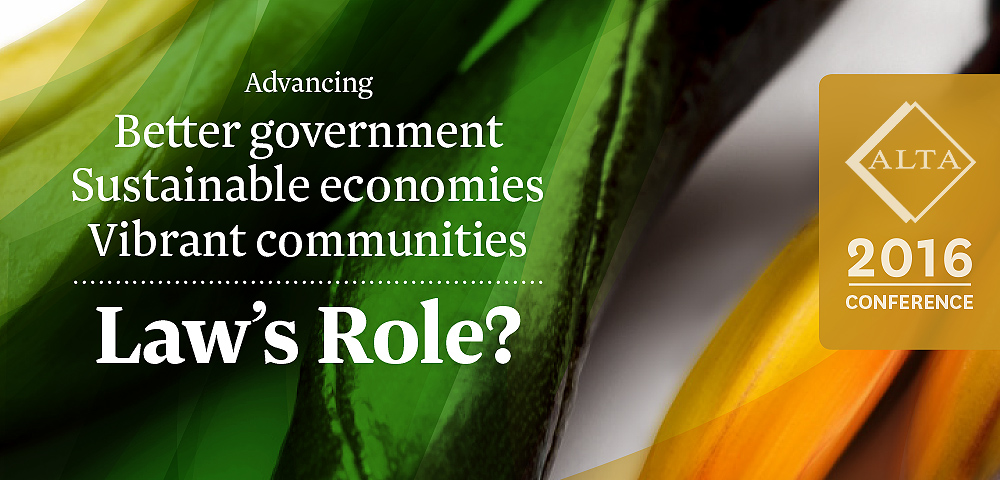ALTA Conference 2016 Call for Papers

We have received numerous high quality paper and panel proposals in response to the call for papers. We thank all those who have submitted proposals and endeavour to contact them within the next few weeks. During this process, the conference organising committee will continue to consider late proposals until 15 April 2016 or until all spaces are filled.
Advancing Better Government, Sustainable Economies, Vibrant Communities …
Law teachers and scholars play a critical role in developing and empowering new graduates to play a responsible, meaningful and influential part in improving our societies. The same applies to practitioners and government advisers when taking under their wings new lawyers. It is also important for lawyers, law teachers and scholars, whatever their area of interest and specialisation, to ensure their research and work is purposeful and forward-looking and that they understand the relationship between public power, the state and the citizens.
… Law’s Role?
Challenging the role of law invites us to look at ourselves in the mirror: what represents a modern and diverse society, a strong and sustainable economy, a better government? What is the role of lawyers and legal scholars in building the future, in promoting law reform? How can law better enable economic outcomes that benefit the communities it serves or should it be concerned with such outcomes at all? What is the relationship between legal and non-legal forms of regulation? How should we evaluate the quality and efficacy of legal regulation and what sorts of evaluative insights should we gather about such legal intervention? How adjustable should law be and, if it is too adjustable or flexible, what does that mean for legitimacy and the authorising environment for law? What do citizens, clients, victims expect from those who articulate, teach, practise or develop the law? Has the time come for more effective recognition of different legal traditions (including indigenous law) in teaching, practice and development of law?
Shaping, developing and questioning law’s role can be addressed from various viewpoints while resonating across all sectors (academia, private, public, NGOs). A number of important sub-themes can be addressed in this regard.
Submitters of abstracts can choose how to address sub-themes or elements thereof but the exercise may produce or draw insights on any of the following areas too:
- Integrity—Integrity is critical in teaching and research as well as in the profession and in government. It can be considered through codes of conduct or practice; development of corporate values; identification and management of conflicts of interest; sound reasoning and lawyering processes; use of technology and avoidance of its abuse and of plagiarism; recognition and avoidance of abuse of power; etc.
- Adaptability—It is important for lawyers and scholars to adapt to, and embrace, our evolving environment, notably as regards new technologies, the reality of multicultural and multidisciplinary settings, and career changes.
- Complexity—Practitioners, government lawyers, law teachers and scholars must navigate an increasingly complex environment where everything comes under scrutiny; where traditional media and new forms of social media, as well as perceptions, can have an instantaneous impact on our and other’s lives, both private and professional.
All submissions are welcome but those from ALTA members will be given preference. Submitters wishing their proposal to be considered as part of one or more particular ALTA Interest Group(s) should indicate this clearly. Notwithstanding this option, the organising committee reserves the right to allocate accepted proposals to panels according to subject areas.
Process and dates
Submissions (by email only) must include full name and affiliation, and provide the title and abstract (up to 300 words) of the proposed paper as well as a brief biographical note (up to 150 words) in an email attachment for consideration by the 2016 ALTA Conference organising committee. Indication in the email and attachment of one or more particular Interest Group(s) (by order of preference) is welcome but not compulsory. The email should be addressed to ALTA-2016@vuw.ac.nz, with the subject line “ALTA 2016 – Abstract [Name]”.
The organising committee will notify acceptance of proposals during April 2016. All presenters will be required to register for the conference by 10 May 2016 to be included in the conference programme.
For accepted papers to be considered for Best Overall Conference Paper, Best Early Career Academic Conference Paper or Best Legal Education Conference Paper, the full paper must be submitted by 10 June 2016. Results will be announced during the conference.
For further queries, please contact ALTA-2016@vuw.ac.nz
Download the call for papers pdf131KB
